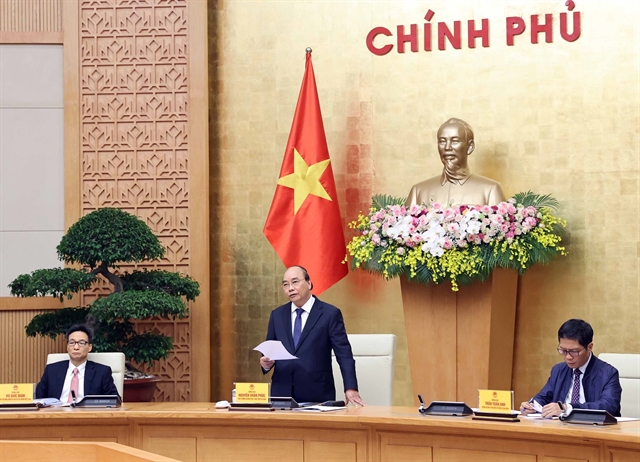 Politics & Law
Politics & Law


|
| Prime Minister Nguyễn Xuân Phúc chairs the National Committee for E-Government's meeting on Wednesday. — VNA/VNS Photo Thống Nhất |
HÀ NỘI — One of the highlights in the e-government building of Việt Nam in the last two years is the inauguration of the National Public Service Portal on December 9, 2019, reported the Government Office at a meeting of the National Committee for E-Government on Wednesday.
According to the office, as of March 8, 2021, more than 2,800 out of total nearly 6,800 public services had been provided through the portal at four administrative levels. The portal received over 116 million visits and more than 468,000 registered accounts.
More than 940,000 administrative documents were processed online through the portal, while 67,000 e-payment transactions were made with total amount of VNĐ26.7 billion. The portal also received more than 10,000 comments as feedback.
The portal has helped save more than VNĐ8.1 trillion (US$351.53 million) each year, along with over VNĐ1.2 trillion each year in paper and delivery costs.
So far, the national reporting information system has connected to the systems of 14 ministries and agencies as well as 37 localities, helping save about VNĐ9.9 trillion each year in accordance with calculations by the Organisation for Economic Co-operation and Development (OECD).
According to the Ministry of Information and Communications, as of 2020, the most important platforms for e-government development of Việt Nam had been formed and operated effectively.
Meanwhile, a number of databases for e-government have been built, including the insurance database with information of 24 million families joining health insurance and more than 90 million people covered by health insurance, along with those on businesses, finance, education, healthcare, and population.
As of December 2020, nearly 40 “Make in Việt Nam” platforms built by domestic businesses had been introduced.
Addressing the meeting, Prime Minister Nguyễn Xuân Phúc, who is Chair of the National Committee for E-Government, noted that the UN placed Việt Nam at 86th position among 193 countries in its e-government raking in 2020, up 2 places from 2018, which showed Việt Nam’s progress in the field. However, in Southeast Asia, Việt Nam only ranked sixth, he added.
The PM said that regional countries’ rises in the e-government ranking means their business environment and competitiveness are improving, creating fiercer competition with Việt Nam across all fields, posing a great challenge for the nation to tackle.
He said that with the issuance of Resolution No 17/NQ-CP, Việt Nam for the first time has a master plan on e-government building, with the focus placed on building institutions and shared platforms.
Reviewing a number of outstanding achievements of Việt Nam in recent years, the PM said that along with socio-economic successes, the country has seen a bright spot in e-government building, especially in 2020.
Besides, he also pointed out a number of shortcomings in the field, including the incomplete legal environment, and limited ratio of level-4 online public services (the highest level available where people’s and businesses’ administrative documents and/or payments can be processed online).
In the future, it is necessary to speed up the provision of online public services, and the effective implementation of the national database on population, thus reducing paperwork in administrative procedure processing.
He assigned the Ministry of Natural Resources and Environment to hasten the building progress of the national database on land, which is expected to be launched in July.
The PM requested ministries, sectors and localities to effectively exploit public services provided online, while actively sharing their data to other State agencies, and ensuring system safety.
The ministries, sectors and localities should complete the building and launching of strategies, programmes and plans in digital transformation for the new period in line with the national digital transformation programme, he said, adding that they should maintain online operations like what was done during the social distancing period due to the COVID-19 pandemic. — VNS




